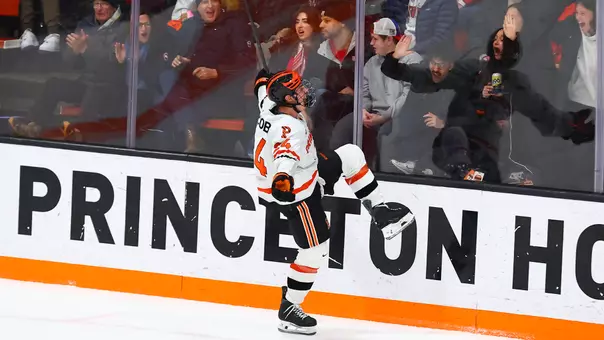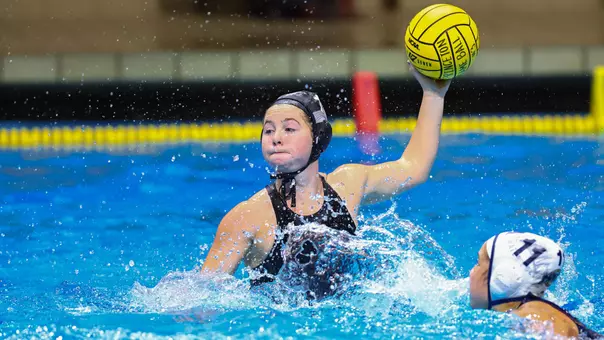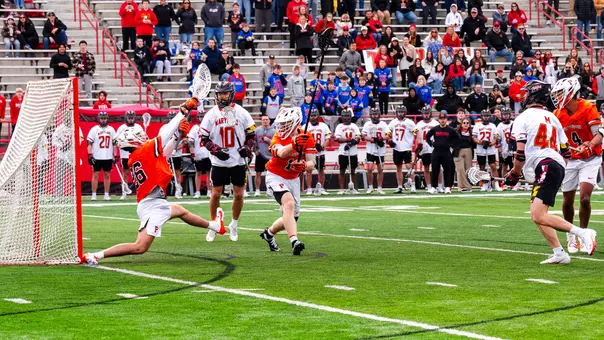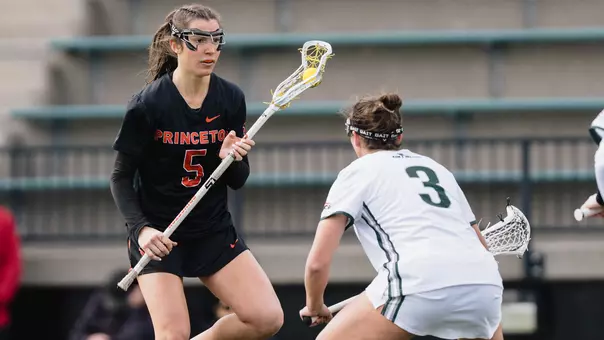Princeton University Athletics
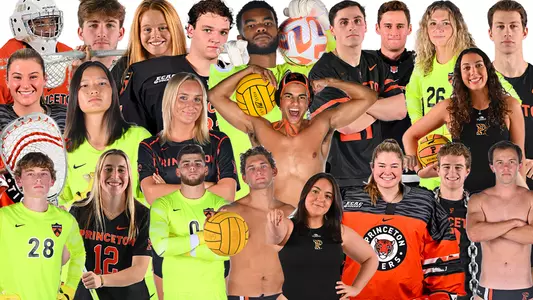
Feature Story: So You Want To Be A Goalie?
April 27, 2023 | Field Hockey, General, Men's Ice Hockey, Men's Lacrosse, Men's Soccer, Men's Water Polo, Women's Ice Hockey, Women's Lacrosse, Women's Soccer, Women's Water Polo
Nulla Memoria.
It translates from Latin to English as “no memory.” I used to know a guy who was a medical doctor and a lacrosse coach, and he drilled that phrase into all of his goalies.
Nulla Memoria.
In many ways, it’s the most important quality of a good goalie, regardless of the sport. No memory.
Gave up a goal? Forget it. No memory. Move on.
There’s another important quality that good goalies must share as well. It's almost like it's in the job description.
“You have to be a different breed,” Princeton head women’s soccer coach Sean Driscoll says about goalies. “Really, you have to be half lunatic.”
There’s a lot to what Driscoll says.
Ella Gantman, a goalkeeper for the women’s soccer team and a Pyne Prize winner, agrees with Driscoll.
“I think goalkeepers have to be a little crazy,” she says. “No matter your sport. Goalies are voluntarily choosing to have stuff chucked at them, whether that's a ball or a puck. It's like the opposite instinct of dodgeball. You are trying to get hit.”
There is no position in sports like being a goalie. It’s hard to equate it to anything else. Maybe it’s a little like being a pitcher or a quarterback in that you’re front and center for everyone to see, but that’s where the comparison ends. To be goalie requires so much, physically and mentally. If all you want to do is get out of running as much as the field players, you probably won’t last.
Want to be a goalie? Here’s what you need to do.
First, like Gantman says, you have to put yourself in the way of a projectile that is heading your way at an unreasonable velocity. Then you have to figure out how to keep it from getting past you into the goal behind you, with nobody else on your team to back you up. Often, this involves getting thumped by the projectile, with varying degrees of padding to protect you.
That’s the physical part. The mental part is that you have to be okay with being out there by yourself as the last line of defense. When the ball or puck crosses the line, you’re the one who has to go and get it out. The player who scored might have made it past every other player on your team; you're the one whose stats now add another goal allowed.
Then there’s the leadership part. You have to know where everyone in front of you needs to be and what they need to be doing at any given moment. If they’re not in the right spot or they’re not doing what is needed, you need to make sure they hear from you about it as it’s happening. The best goalies can prevent the other team from scoring without ever having to make a save because they have moved their defense in position to prevent a shot in the first place.
You need to be loud. You need to be confident. You need to be fearless. You cannot have thin skin, literally or figuratively.
“I would definitely say we are a little different than most athletes,” says Princeton men’s soccer goalkeeper William Watson. “It takes a certain mentality to take a shot straight on from five feet away without flinching. On the flip side, it takes a certain mental fortitude as goalkeeping is one of the most punishing positions in sports. Making one mistake means a goal; let it affect you then you'll let in two more.”
Christian Hartch, a men’s water polo goalie, is more succinct.
“Generally,” he says, “goalies are slightly crazy.”
Watson and Hartch are two of the 22 current Princeton athletes who are goalies, or goaltenders, or goalkeepers, or keepers, or whatever each sport's venacular is. They play across five sports: field hockey, ice hockey, lacrosse, soccer and water polo. They came to Princeton from far and wide, with two from Europe, one from Canada and the rest spread across 10 states and the District of Columbia.
One of Princeton’s goalies isn’t really a goalie. He’s actually a lacrosse defenseman named McKnight Pederson, though he did spend time this winter as the emergency goalie on the men’s hockey team. He never got into a game for the hockey team, but I've included him here because he had the guts to let people fire pucks at him knowing because the team needed someone in practice.
“I would agree that goalies are a little bit different,” Hartch’s teammate West Temkin says. “We see the game like no other player and can read the field better than anyone else. All of the goalies I have met, including me, we have a personality that is different from field players and is actually stranger, but in a good way.”
“For me, I’m looking for someone who has a presence,” Driscoll says. “You need a presence, a confidence that everyone can see. You need the ‘IT’ factor. I like to start from the goalkeeper out. We want someone athletic and with a commanding presence. That’s through their voice, through their body language, the ability to command the backline.
“Quiet goalies,” he says. “They don’t tend to do well.”
Was he ever a goalkeeper?
“You’re kidding, right?” he says. “Not in a million years.”
As for me, I have been fascinated by the goalie position, and given goalies my biggest respect, for a long time, going back to when I first saw Scott Bacigalupo play the position for the Princeton men’s lacrosse team in the early 1990s. As I watched the sport for the first time, I was shocked that anyone would agree to stand in the cage.
“You have to be willing to get hurt and play through pain,” says Sully Atkin of the men’s soccer team. “Having a ball kicked as hard as possible at you isn't what most people would consider fun, but for me, that's something I look forward to every day. So yeah, goalies are a bit different. They have to have a different mindset.”
As I watched Bacigalupo, I came to ask myself the same question over and over again. Who in the world would agree to do this? I asked Sam English, the All-American midfielder for the Princeton men’s lacrosse team, if he’d ever been a goalie.
“Nah,” he says. “On every team I ever played on, hockey or lacrosse, the goalie was always the crazy dude.”
For full disclosure, my son Greg was a lacrosse goalie from second grade through four years of playing at Sacred Heart University. Like most goalies, he’s a bit out there too.
My favorite thing about goalkeeping is the feeling after you make a big save that everyone thought was definitely going in. I like hearing the crowd practically cheering right before you make your save and then the hush that comes right after. It is super satisfying. I also think goalkeeping in soccer, because there are so few good chances across a game, is really special, because you train so hard for just two or three moments all game. That makes those moments even sweeter when your training pays off.Ella Gantman, women’s soccer
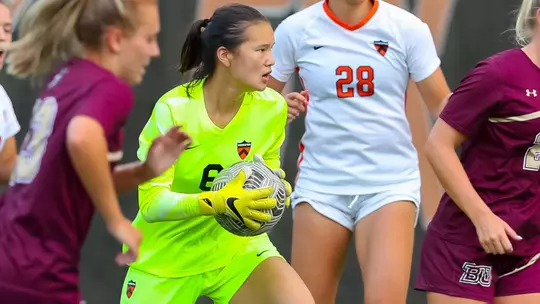
Princeton has a long history of producing great goalies. Bacigalupo, for instance, is considered to be among the top five to ever play the position; he’s one of four Princeton goalie alums in the National Lacrosse Hall of Fame. From men’s hockey, Mike Condon had a successful NHL career, and other Princeton goalies like Erasmo Saltarelli, Zane Kalemba and Colton Phinney have been dominant. Kim Newell was a great goalie for the women’s ice hockey team and a pro draftee; Steph Neatby was the backbone of the 2020 ECAC Championship team, making 60 saves in the final two games of the tournament and once making 60 saves in a single ECAC playoff game. The women’s lacrosse team has had six All-American goalies. The field hockey team has had six different goalies win 30 career games, starting with the great Sue Kohler in the late 1970s/early 1980s. One of those goalies, Christina Maida, got the win in the 2012 NCAA Championship Game.
The women’s soccer team became the only Ivy League team ever to reach the Final Four by rotating two great goalkeepers — Madeline Jackson and Emily Vogelzang — game-by-game back in 2004. The Tigers have had great keepers since the first days of being a varsity program in the early 1980s, when Kelly O’Dell set goals-against records that still stand. Natalie Grossi has the program record for shutouts, and her seven-save, one-goal-against performance in the 2-1 win over powerhouse North Carolina in the 2017 NCAA tournament Round of 16 was epic. The men’s soccer team record for goals-against average in a season is 0.22, by Chandler Brewer back in 1942, which was five years after Ty Cobb (not that Ty Cobb) had set the record at 0.66. In the more modern era, the list of great Princeton men’s soccer goalkeepers includes Tom McCabe, Jason White, Jacob Schachner and the father/son duo of Tom and Jack Roberts. Rob Pawloski led the Tigers to the NCAA Final Four in 1993.
The standard for Princeton goalies, though, has been set in the pool, by the greatest women’s water polo goalie of all time, Tiger alum Ashleigh Johnson. There is only one Ashleigh Johnson, and she was, and still is, everything a goalie needs to be. She has two Olympic gold medals, including one as an undergrad, and she has been named the top women's water polo player in the entire world on multiple occasions.
“It’s pretty cool to be playing her position here,” Lindsey Lucas says.
Lucas is the current starting goalie for the women’s water polo team, which has had an extraordinary season to date. She and her teammates are hosting the conference tournament this weekend at DeNunzio Pool, where the 27-3 Tigers, ranked ninth nationally and the tournament’s top seed, will attempt to get back to the NCAA tournament.
Lucas is one of the main reasons why. The freshman from California has started 27 of the team’s 30 games, with a save percentage near 60 percent and even a goal of her own. She was named the College Water Polo Association Rookie of the Year and a first-team all-league selection.
Is being a water polo goalie the toughest goalie position? Perhaps. You have all the usual “oh no, the ball is going to hit me in the face” issues with a ball that is being blasted at you from relatively close distances, and you have to be able to see everything in front of you and keep the defense directed. Add to that this small fact — you have to do all this while you’re treading water.
“Once you’ve been doing it for a while, the treading part is easy,” Lucas says. “It’s a hard position though. Goalie is unique. The training completely different. The team does one thing; you do something else. One thing I’ve found, though, is that you may be a bit separated from your teammates, but you have an even better relationship with them.”
There are a ton of great pictures of Johnson in goal, but the most iconic one shows her almost lifting completely out of the water to snag a ball headed to the top right corner. How does a goalie manage to get that much elevation from treading water?
“It’s called a ‘lunge,’” Lucas says. “It’s a breaststroke kick, and you pull yourself up with one arm.”
There are several lures to being a goalie. One, you’re in the center of the action. Two, you don’t have to run as much as the field players, or, in this case, swim.
“When I was a 10-and-under, I would see all the goalies go to the goalie training,” she says. “It look fun. And maybe I didn’t want to be swimming with the field players. They said ‘goalies over there,’ and I was like ‘I want to do that.’”
Did she flinch when the ball first came her way?
“I still flinch,” Lucas says. “You know, I’d like to protect my face.”
I became a goalie by accident and not on purpose by any means. I was a field player on the C team when I was 14 years old and was the tallest kid in the pool. We would practice in the same pool as the A team, and one day I was approached by the A team coach who told me I was going to be their goalie. Apparently their goalie was aging out and they needed a replacement fast. From that point on I was a goalie.West Temkin, men’s water polo
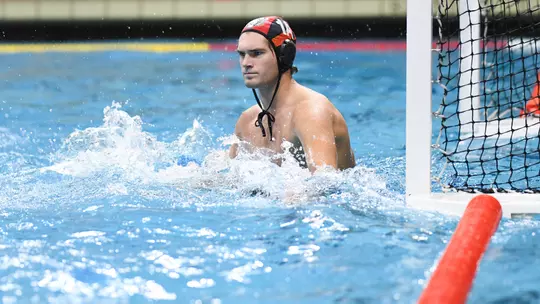
Human nature, or should that be human survival, is predicated on the idea of avoiding danger. Saving the ball often revolves around exposing yourself do danger. Perhaps the first goalies were the ones who decided to fight the sabertooth tigers while everyone else was eating leaves.
It helps to have a little bit of a daredevil in you. Robyn Thompson knows about that.
“I have always been a bit fearless,” says Thompson, an All-Ivy League field hockey goalie. “I was never afraid of getting hurt. I did equestrian horse riding, and my parents always said I was crazy. I did jumps with no hands, no saddle. Now that I’m older, I don’t really understand why I ever did that. You have to be a certain level of fearless and unfazed about getting a few bruises. It’s the nature of the position.”
She actually started out playing both the field and in goal for two different teams. She even scored a bunch of goals, which she liked. There was something about being in goal, though, that really appealed to her.
“I liked how much of a difference a goalkeeper can make,” she says. “If the other team can’t score, you can’t lose. I liked how much you could influence a game. And I was better at it, throwing myself around and all.”
As Thompson talks, her voice gives away where she is from, which is near Dover, in Southern England. Her roots in goal, though, go back to South Africa, where her father grew up and where he was a highly accomplished goalkeeper in both field hockey and soccer before an injury in a game ended his playing career just short of the international level.
“My dad always says that a good goalkeeper can make or break a game,” she says. "Also, I like that it’s something that my dad and I have been able to share. He used to be better than I am. He probably still is, actually.”
Her father was one of her early coaches, and he encouraged her to try to be a goalie when she was nine. How does such an accomplished player in his own right get a newbie to get used to the position? Her introduction to playing the position came when her dad and her other coaches would throw field hockey balls at her head to get her to trust her helmet and to get used to not flinching. It worked, for the most part.
“A lot of the pictures I see where I’m making a save, my eyes are closed,” she says. “I’d like to think I’m watching the ball to the last split-second. When I was in England, I used to train with men’s teams. They can hit a lot harder, and that got me used to getting hurt.”
If you’ve never seen a field hockey ball, it’s sort of a like a round piece of concrete. The sound it makes when it clanks off the wood in the back of the cage is a unique one, and a loud one. Now imagine that the ball doesn’t make it to the wood. Imagine it makes it to some part of your body. Yes. Ouch.
Fortunately, field hockey goalies wear protective gear that cushions the impact that the ball makes. There are a few downsides of course. Why would something related to being a goalie be easy?
First, there is the equipment itself. It is heavy and cumbersome, and it can take forever to put on at first.
“I can do it now in four minutes,” Thompson says. “When I first started, my parents had to help me do it, for maybe two years.”
Then there is the fact that when you’re wearing it, you’re not exactly comfortable. It’s bulky, and it also is sweltering in the warm weather.
“People think it keeps you warm in the cold,” Thompson says. “In reality, I think it traps the cold. It’s very, very cold in the winter, and it’s very, very hot in the summer. I can get it off in 30 seconds once the game is over.”
Lastly, there can be gaps in the padding when you’re running. The best goalies in field hockey have to know when to come out and challenge and when to stay in the cage. They also have to decide whether to stay upright or to dive. When they do, the gaps in the padding can come into play.
“The kneecaps,” Thompson says. “The ball seems to catch me when my knee is bent. And my shoulder too. It always seems to find the gaps.”
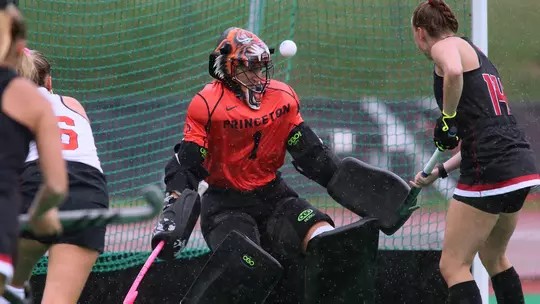
Although it sounds basic, saving the ball is my favorite part of the position. Getting up after a great save to keep your team in the game is the best feeling on Earth, and it's one of the reasons I enjoy playing soccer, and specifically goalie, so much. Even if I'm having a tough practice or game, making a great save makes all the negatives go away.Sully Atkin, men’s soccer
So when Greg was in second grade, I signed him up for Lower Bucks Lacrosse. When they saw I was wearing Princeton gear, they asked me to run the program. And so I did. We had 60 kids, and I divided them into four teams of 15 players each. We ran drills with two of those teams while the other two played 7v7 without a goalie, and then after 30 minutes switched it up.
When the year ended, we challenged the third graders to a game. When we got there, I realized we needed a goalie and didn't have one. I asked if there was a volunteer, and one hand went up. Greg’s. I looked at him like he was nuts.
From that day on, through youth and club, four years of high school and four years of college, my son was a goalie. I spent hours and hours shooting on him, first with a tennis ball and eventually with a lacrosse ball. I can’t remember how old he was when I first was able to shoot on him as hard as I could, but it didn’t take long. We had a game we’d play at the end where the winner would be the first one to get to either five saves or five goals. We never really agreed on what the winner would get, but we competed hard nonetheless.
As such, if there is anything I can talk about on subject of goalies, it’s what it’s like to be the goalie’s parent. If you think it’s tough to be the goalie, try watching your son or daughter play. I always felt like every time he gave up a goal, everyone would look at me like if I had done a better job of raising him, he would have saved it.
Seriously, it’s an excruciating thing. Most goalie parents stand off by themselves, far away from the cheering — and chattering — of the parents’ section. It’s a lonely, brutal existence. Nobody ever blames the defenseman's parents.
No story about goalies can really capture what the position is about without hearing from the parents. And to that end, I reached out to two different locations, separated by 1,500 miles, in two different countries. And what did I get when I explained what I was asking? The same response.
Laughter.
The phone rang in the Pearson house in Fredericton, in the Canadian province of New Brunswick, which borders Maine to the northeast. Pearson is a goalie for the Princeton men’s hockey team.
His parents Lynn and Frank watch every game, either online or by coming to see the games in person. On the weekends they travel, they won’t talk to their son before the game, which means saying a brief “hello” when they get there on Friday and then not talking to him again until after the game Saturday.
When I call, Lynn answers the phone. After I introduce myself, I say that I’m writing a story on what it’s like to be the parent of a goalie. Lynn immediately laughs.
“It’s stressful,” she says. “That’s for sure.”
Then I explain that I can relate, and it’s like we’re immediately part of the same secret society. She even starts to refer to us as “we.”
Lynn Pearson’s maiden name was Marotte. She’s the daughter of Gilles Marotte, who played 12 seasons as a defenseman in the NHL and then two more in the old WHA. Marotte, a 1973 NHL all-star with the Los Angeles Kings, passed away from pancreatic cancer in 2005.
“My dad always said that goalies are a different breed,” Lynn says. “He always said they’re a bit odd. I thought ‘oh my, what would my dad say if he knew my son would be a goalie?’ He was pretty little when he first decided to go in goal, and I actually tried to discourage him. I asked him why, and he said he loved when the players jumped on him. He’s always liked having such an important role on the team.”
Lynn has managed to sit with the parents at most games. Her husband Frank has not.
“My husband won’t sit with me,” she says.
“She drives me nuts,” Frank says laughing.
Frank Pearson spent 25 years in the Canadian military.
“From my military training, I’ve learned not to worry about things I can’t control,” he says.
I always told Greg that he needed to look at each possession for the other team as its own game. If you give up a goal — which is to say you lost that mini-game — then win the next one. No memory, right?
Frank has told Ethan the same basic message. Frank was a hockey coach, and he coached Ethan back when his son was a defenseman. When his father came back after coaching a different team one weekend, he found his son in net. After that, he also spent hours shooting on him.
“To me, you think the game is stressful,” he says. “I just watch and hope he does his best. I always told him not to worry about the bad shots. Brush them off. Focus on the next one. Hey, they went through five guys in front of you. Don’t think it’s always your fault.”
After I hang up with the Pearsons in New Brunswick, I call Megan McCamey. Her daughter Tyler is goalkeeper on Driscoll’s team.
I have the same start of the conversation as I had with the Pearsons.
“I’m writing a story about goalies and wanted to ask you about what it’s like to be the parent of a goalie,” I tell her.
She laughs. Loudly. Then I explain that I understand, that I’m part of the secret society.
“When she was younger,” Megan says, “all the goalkeeper parents used to joke about trying to find a tree just far enough away from the field to still be able to see the game but far enough away that your jitters won’t be obvious. Even now, I can usually sit with the rest of the parents, but there are still times I need to step away. Maybe I’m hardened a bit, but it’s still stressful.”
The toughest part for a soccer goalkeeper, in all likelihood, comes on corner kicks and other set pieces near the box. The keeper needs to be aggressive, often rising up in the crowd to punch the ball away. When you’re up in the air, focused on the ball, anything can happen.
“You have to decide you have no fear physically,” Megan says. “There was a great shot of her from a game against Columbia. Tyler was up in the air in the mix of five players, going for the ball. You have to have no fear. You have to know that it might hurt, that at some pont you’re going to get hurt. You have to go after it anyway. You have to dive. You have to dive into the air and know there’s nothing to catch you.”
“How does that make you feel, as her parent,” I ask her. I already know the answer. I’ve been there many times.
Then she answers, and when she does, she speaks for every parent of a goalie everywhere.
“Before each game, I say a mantra,” she says. “It’s ‘Joy, and no injuries.’ Feel joy for the minutes she plays, and hope for no injuries.”
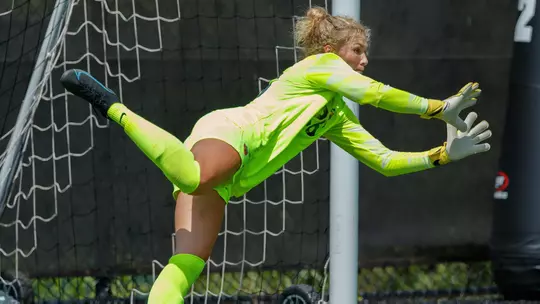
When I was younger, I always played hockey with my sister. She was a forward, so gradually I became the goalie little sister that she could shoot on. I loved playing goalie and eventually I just stuck with it. I definitely agree that goalie are a little different. As a goalie you have to be the strongest mentally on the ice, because the position is just as difficult physically as it is mentally. Everyone has their own way of getting “locked in”, and for me I like sticking with the same routines to prepare myself. So yes, I would call myself very superstitious.Taylor Hyland, women’s hockey
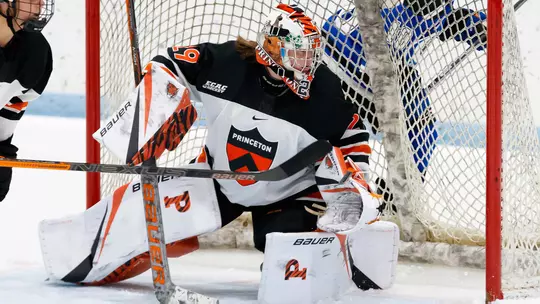
I asked all of Princeton’s goalies if they considered themselves to be superstitious. Pearson, for instance, always wears the same dirty socks, at least according to his parents.
Gantman from the women’s soccer team has her ritual.
“I make sure I touch the crossbar and both the right and left goalposts before each game for luck,” she says, “because those guys can make all the difference.”
Atkin’s pregame ritual is even more etched in stone.
“I'm extremely superstitious,” he says. “I've been doing the same pregame ritual before every game for basically my entire life, and it's a very specific process that has to remain the exact same every time. If I do something out of order, I have to start all over again; otherwise, I won't feel right for the rest of the game. It sometimes annoys me how superstitious I am, but I know there's nothing I can do to change it.”
Thompson also has the same pregame ritual, mostly related to timing of her warmups, though she also insists on putting on her pads in the same order: left kicker, right kicker, left pad, right pad.
“That’s something I am superstitious with,” she says. “I don’t know why. If I put my right kicker on first, I have to take it off and start over.”
Hartch, from water polo, won’t start to play unless he’s done his ritual.
“I do a specific jumping routine within the water, including a double tap of the top crossbar, before putting my head on the back of the goal.”
How does that help? Probably the same way that eating one strawberry Pop Tart does.
That’s the pregame routine of Michael Gianforcaro. With all due respect to goalies in every other sport, even water polo, nothing is quite like being a men’s lacrosse goalie. Even Driscoll concedes that. He calls men’s lacrosse goalies “the highest degree of lunacy.” In men’s lacrosse, you have almost no padding. There’s a chest protector, padded gloves, a helmet and a cup. There are no shin guards. There are no knee pads. Ask a goalie to wear those, or arm pads or elbow pads, and they’ll be insulted. The thought is genuinely offensive to them. How can you question his toughness like that?
A lacrosse ball is an extraordinarily tightly wrapped circle of rubber that comes at you at speeds that can reach 100 miles an hour. As a result, men’s lacrosse goalies are one continuous bruise when they’re in season. Certainly my son’s arms and legs would always agree with that statement. I'm always humored when an announcer during a game will refer to a “great” save or an “easy” save. Hey, I've been a lacrosse broadcaster many times before and I used to say it too. And every time I did, i caught myself and thought “every save is a great save.”
You would have to think that your average men’s lacrosse goalie is flat-out crazy. They must be daredevils, skydivers, guys who jump motorcycles over buses. Certainly there are some like that.
Princeton’s goalies? Not quite. Griffen Rakower, a senior, won the NCAA Elite 90 Award last year for having the highest grade-point average among all players at the Final Four. Gianforcaro? As loudly as he directs his team on the field, that’s how softly he speaks off of it. He is almost humored by the idea that he has to be a bit nuts to do what he does, even if he realizes that there is truth to that.
“In the moment, when a guy is really close, you know you might be able to save it with your stick,” he says. “You know you’re probably going to have to save it with your body, and you know it’s going to hurt. But in that moment, I’m not really thinking about how badlyl the ball is going to hurt or anything. I just want to find it and get on it. Kick it. Get a leg on it. Anything.”
One big difference between goalies in lacrosse and water polo and goalies in other sports is that in lacrosse and water polo, you know you’re not going to shut the other team out. Princeton men’s lacrosse hasn’t shut anyone out since the 1950s. It probably will never happen again. As such, goalies need to be okay with that. They cannot let giving up a goal bring them down.
“You have to flush it,” Gianforcaro says.
“Wait, what," I ask him. “Flush it?”
“Yeah. Flush it. You can’t make every save. Sometimes I struggle with that, because I want to make every save. If there’s an outside shot or I didn’t make the play, I get upset. If you let that bleed into the next shot, it becomes a hard thing to do to get rid of it. If it’s a shot I think I should have saved, I have to quickly diagnose what went wrong. Did I see it? If I did, why didn’t I save it? Then I can evaluate after the game.”
There was a time when goalies in lacrosse were just big kids who wanted to play but couldn’t run. Those days are long gone.
“Goalies are surprisingly good athletes,” Gianforcaro says. “If you want to be a goalie, you also have to be one of the hardest-working guys on the team.”
Gianforcaro, like pretty much everyone else, started playing in the field but fell in love with the goalie position when he first tried it at around age 9 or so.
“When I first started, I was 100 percent flinching on the shot,” he says. “I was almost surprised when I made a save. But you train over and over and over. The most difficult thing is that it’s all reactive. You can train someone to run differently or shoot differently, but goalie is all reactions.”
He must be doing something right. He’s second in the country in save percentage. A week ago, he made 20 saves in a win over Harvard to help set up a showdown this Saturday in Ithaca against Cornell for the outright Ivy League title.
Gianforcaro also is part of one of the downsides of the position, and that is that only one person can play it at a time. He and Rakower began the year splitting time in goal, but then Gianforcaro took over as the sole goalie in mid-season. It’s not easy when you have two who are really good, especially two who are as close as Rakower and Gianforcaro. If they played any other spot on the field as well as they play goalie, they'd both find themselves with regular playing time.
“It’s really hard,” Gianforcaro says. “Rack and I are really good friends, and we both want to be the goalie. We both want to succeed. Look, I want him to succeed, but that would mean that I don’t get to play. The same is true of him. It was really tough to balance, and it still is. But regardless of who plays, we both want the other to succeed. A year ago, we knew Erik [Peters] was going play. This fall and winter, it was something we didn’t talk about, but we knew there was a clock where someone would have to make a decision.”
At Princeton’s celebration of its senior class after the Harvard game, it was Gianforcaro who spoke about Rakower.
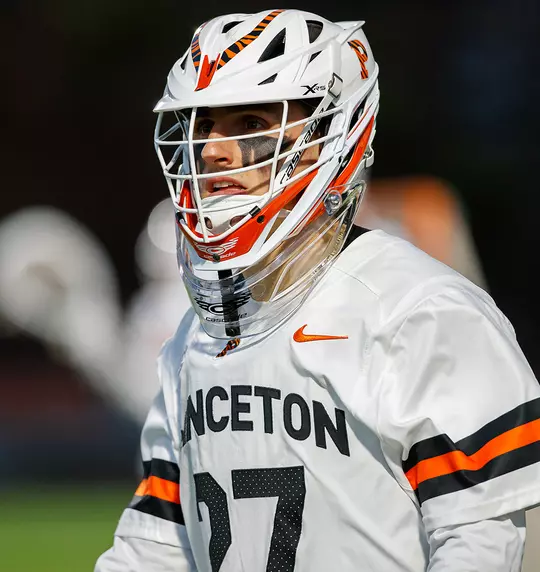
I became a goalie because my favorite player, Kari Lehtonen, on my favorite hockey team growing up [the Atlanta Thrashers] was a goalie. I used to go to Thrashers games in full street hockey gear dressed like Kari. My mom painted the pads, glove, blocker and mask to look exactly like his. I started playing hockey at 5 and playing goalie at 6, and I never looked back.Ben Crewe, men’s hockey
The skills and tactics differ greatly among goalies in various sports, but there are commonalities. There is a bit of an understanding among all of the goalies at Princeton that they are part of something unique.
“In every sport, the goalie is on an island,” Gianforcaro says. “There’s nobody there to help you out. The defense is in front of you and can make it easier or harder, but at the end of the day, you have to stop the ball.”
It sounds so simple. It isn’t.
I thought a good way to end this story would be to actually jump in goal for one of the teams to see what it was like. I can’t skate well, so that let out hockey. I can tread water, so maybe water polo. I have reasonable hand-eye coordination. I thought that after watching lacrosse all these years, maybe I would try that. Could I try soccer?
Then I figured field hockey was the one. Put on all that padding. Hop in the cage. Swat away a few shots. Yeah. Field hockey.
That’s when I remembered that I’m not nuts enough to try it. In the world of goalies, either you are one, or you are not one.
I am not one. Neither are most people. The ones who are? They’re special. They may be out there and all, but they’re really a special breed.
So there you have it. Goalies are wired differently.
Their parents just have to deal with it.
— by Jerry Price
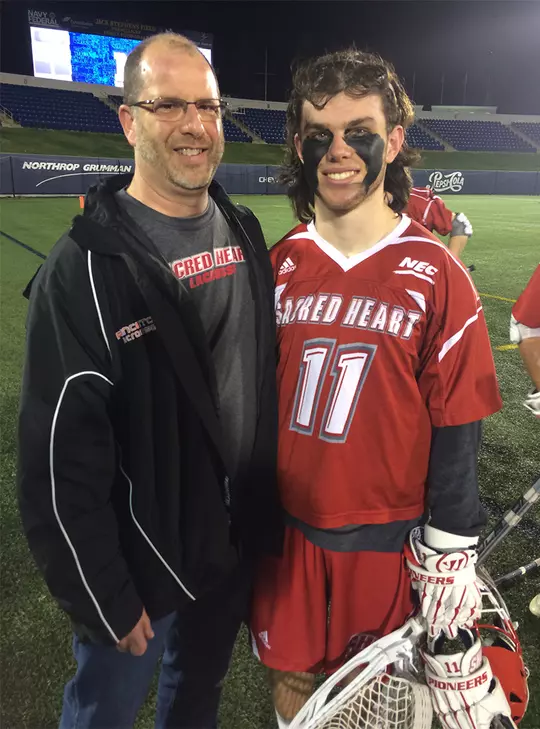
Princeton's 2022-23 Goalies:
Field hockey
Robyn Thompson – Herne, England
Men’s hockey
Ben Crewe – Arlington, Va.
McKnight Pederson – Park City, Utah
Ethan Pearson – Frederickton, NB
Aidan Porter – Weston, Mass.
Women’s hockey
Taylor Hyland – Wellesley, Mass.
Jennifer Olnowich – Madison, N.J.
Men’s Lacrosse
Ryan Croddick – Rumson, N.J.
Michael Gianforcaro – Lincoln University, Pa.
Griffen Rakower – Pleasantville, N.Y.
Women’s Lacrosse
Amelia Hughes – Wilton, Conn.
Tia Reaman – Hingham, Mass.
Men’s Soccer
Sully Atkin – Arlington, Va.
Kamari Hadaway – Alexandria, Va.
William Watson – Asheville, N.C.
Women’s soccer
Ella Gantman – Washington, D.C.
Tyler McCamey – Atlanta, Ga.
Men’s Water polo
Christian Hartch – Greenwich, Conn.
Antonio Knez – Dubrovnik, Croatia
West Temkin – Alamo, Calif.
Women’s Water polo
Alexa Kourepenos – New York, N.Y.
Lindsey Lucas – Orinda, Calif.

